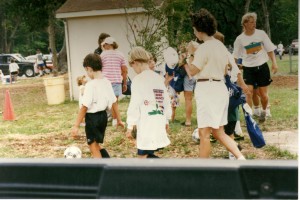April 14, 2011 GUEST BLOG POST by Mike Emmerling
 The Centers for Disease Control and Prevention, CDC, along with the support of partners and experts in the field of concussions, developed a “Tool Kit” for high school coaches giving them knowledge, attitudes, and practices related to the prevention and management of concussions. The Centers for Disease Control and Prevention did a study on their “Tool Kit” in 2005-2006 using their website for coaches whose schools owned and used the “Tool Kit” as their participants.
The Centers for Disease Control and Prevention, CDC, along with the support of partners and experts in the field of concussions, developed a “Tool Kit” for high school coaches giving them knowledge, attitudes, and practices related to the prevention and management of concussions. The Centers for Disease Control and Prevention did a study on their “Tool Kit” in 2005-2006 using their website for coaches whose schools owned and used the “Tool Kit” as their participants.
This study was a mixed method evaluation first by a mail survey which collected quantitative information on coaches’ use of the “Tool Kit.” Second, six focus groups were conducted with a sample of coaches who responded to the survey to gain further insight into the quantitative findings. A semi-structured moderator’s guide with open-ended questions was used to lead the particular focus groups discussion(s). The participants were made aware that the focus group discussion(s) would be audio recorded and no participants objected. Finally participants were self-selected and represented diverse geographical locations on a variety of various sports.
Of the 333 eligible coaches who responded to the survey, most were male and coached at a public high school. Most of these coaches had over ten or more years’ experience. The majority of the coaches lived in suburban or rural areas with less than 1,000 students in their school. The variety of sports that these coaches coached included football (41%), boys’ basketball (13%), and girls’ soccer (11%). Concussions were highly relevant topic because 63% of coaches reported being aware of sports-related concussions among their athletes during the 2005-2006 playing season.
The end results of this study showed that the “Tool Kit” led to positive changes in high school coaches ‘knowledge, attitude(s), and behavior(s)/skills toward concussion prevention and management. Despite the fact that most of the coaches who responded had 10 or more years of coaching experience, the coaches made changes in the ways they prevent and manage concussions. Findings from this survey also suggest that many coaches face barriers to preventing and addressing concussions because there is no specific concussion policy in high school sports. This study in the end shows that coaches have a strong role and responsibility when dealing with the safety of their athletes and concussions. Coaches feel obligated to educate themselves about concussions to ensure the correct use of safety equipment and implement training techniques that minimize the potential concussion risk by allowing more people who are experts in concussions to become more involved in the sports program.
Sarmiento, K., Mitchko, J., Klein, C. and Wong, S. (2010), Evaluation of the Centers for Disease Control and Prevention’s Concussion Initiative for High School Coaches: “Heads Up: Concussion in High School Sports”. Journal of School Health, 80: 112–118.

I am very happy to see the issue of concussions finally starting to really be addressed in the public. As an high school athlete, I experienced a concussion from girls soccer. Five years ago, this was not that big of a deal. I got told I was okay and would just have to sit out for one game. I am happy that this article points out that more experts need to get involved. Not only should athletic trainers be trained for the signs of a concussion, but the coaches as well.
Athletes also need to be trained on the signs of a concussion and the consequences they may have. I knew many high school football players who thought they could have received a concussion during practice, but would not speak up about it because they wanted to play in the next game. I think communicators need to use threat in the extended parallel processing model to make athletes understand that their future health matters a lot more than one game.
I think this topic is really hitting society hard and people are becoming aware. Like the article said, education of coaches is becoming a growing trend, which will not only help prevent concussions, but help the treatment of them.
AS a Penn State student athlete finishing up my fifth year I have seen the direct effects of more attention being given to concussions and how coaches and trainers can prevent them. I am not sure what this tool kit entails however I can bet that it has something to do with enhanced testing of athletes after any type of blow to the head. I went through many concussion tests one day this semester when I suffered a blow to the back of my head in practice. These tests are many quick tests that are done to make sure that a concussion is 100% not present like memory and balancing. In my case even something as small as a headache was enough to keep me out for a day and required a doctor to test me before I could rejoin practice.
As I am writing this I realize that this happened to me at Penn State where trainers are extremely accessible. In many high schools trainers are not always readily available at every point in practices. Therefore this article makes excellent sense now because the one individual who is always around the players on the team is the coach. As mentioned at the end of this blog, the concussion education of coaches has become a very significant aspect to their job. Even if a coach knows just enough to test for all the concussion symptoms after a head injury, this may be enough to prevent a more serious head injury for the athlete later on.